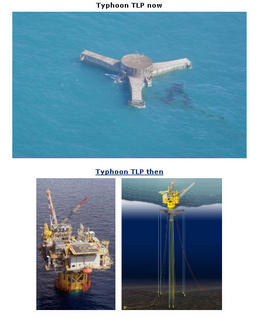
Nearly all of gulf of Mexico oil and 80% of gas production, is "shut in" at present. This is adds up to 28% of total U.S. oil output and 14% of total U.S. natural gas output, according to a Whisky and Gunpowder report. And thanks to Whiskey and Gunpowder for this spectacular graphic of the capsized platform Typhoon!
It will not be possible to simply repair, rebuild and replace all the damaged infrastructure. It will all have to be redesigned and re-engineered from scratch, to a higher, and much more expensive, standard.
Here is why: The Houston Chronicle reports that that gulf oil infrastructure was built and insured for a "hundred year storm". It turns out that a hundred year storm, an oil industry definition, was basically equivalent to a category 2 to 3 hurricane. This is clearly insufficient and uninsurable now. To build to withstand a category 5 hurricane, platforms have to be build much higher and stronger, requiring more steel and more labor.
We may find that the capital to build all that stuff is not so easy to raise. Even the giant oil companies don't seem eager to spend their profits on last year's energy systems. For example, why would you build a new, state of the art refinery if you'll have to be begging for access to crude feestocks (of unknown quality) from foreign sources? As for production, the best fields will no doubt be brought back to production, but there must have been many gulf oil fields that were declining or approaching decline. These won't pencil out any longer.
The federal government has the greatest interest in getting Gulf production back online, and they will only be able to make that happen with federal financing and guarantees. The capital will have to come from foreign sources. Will other nations be eager to finance our energy infrastructure?
Maybe not:
a) all we do is waste our gas on SUVs - this is not a good return on capital
b) other nations are scrambling to build and secure their own energy supplies, at great expense
c) we have a huge and threatening military. Reducing our energy availability would de-power our military capability
So, I believe the gulf of Mexico won't ever come back to its pre-Katrina production level. How much will be brought back? Heck if I know.